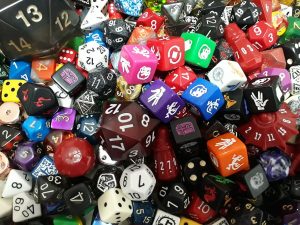Role-Playing Games, What Are They?
What are RPGs? What and how many types of games are there on the market? What do you need to know and have available to play an RPG? In recent years, “the nerds in the field” have witnessed a sparkling ferment in publishing linked to role-playing games, a ferment so lively as to involve an ever-increasing number of fans and make both self-productions and projects proliferate as never before. editorials made by great publishing giants. However, those in the sector know very well what they are writing about, but those who have never rolled a “20 die” are asked: ” Do you know what role-playing games are ?”, ” Do you know if do you win anything at these games ? ” or “ But are they video games?“; rhetorical questions aside, this article will offer an in- depth analysis of what role-playing or “RPG” is, how it is and when it was.
The “classic” role-playing games: general characteristics
Just to be consistent and to break the ice, we start from a definition of the so-called “classic” role-playing games, that is, with masters and players:
A role-playing game (RPG) is a paper game that has as its object an interactive story whose protagonists are the characters created by a group of players (often between 1 and 6), who can influence the story told them by a player defined as “master” through simple narration or, in some cases, through a particular and detailed use of a certain number, and of a certain type, of dice
 Four elements can therefore be noted:
Four elements can therefore be noted:
- Role play is a story
- There are players
- There is a particular player called “master”
- The dice are used
Of these four elements, a summary:
Story : An RPG is the telling of a story of any kind! Horror, fantasy, sci-fi , fairytale, inspired by a film or cartoon, short, long, red, yellow, green … in short, a story of any genre or type. The difference with traditional stories is that, unlike the latter, the story of a role-playing game is interactive, that is, it is “shared with” and “editable by” all the parties sitting at the table.
Players : There is no story without protagonists and RPG players are exactly that. In fact, the players interpret the part of characters created by them starting from the world described by the story and are, for this reason, the engine of the plot, those who, interacting with the master, and therefore with the story, will evolve the plot in a way rather than in another.
Master : The master is the one (or she) who (or who) is instructed (or instructed) by the other players to tell them a story (of any kind) of which only he (or she) knows the plot, the details. and all the possible implications and, therefore, the master embodies every single aspect of the reality of the story, from the most important characters (those not “belonging” to the players, of course) to the humblest of flies (as long as there are any ).
Dice : since RPG is a type of game based on sharing a story between X parties, who will not always agree on how to carry the story forward, this type of game generally incorporates a ” conflict resolution system “, that is a system of rules and a random engine (mostly a system of using dice) well defined that is able to manage those moments in the story in which the story of the players jeopardizes the safety of their characters or, more simply, turns out to be, for all parts of the table, a narrative with a totally obvious outcome . Of course this does not imply that, for a player, rolling the dice to check the outcome of their narratives is like playing “heads or tails”since rolling the dice in a role-playing game actually means activating a more or less realistic simulation mechanism capable of returning, by means of a simple calculation of probability and basic arithmetic, a realistic or, at least, “sensible” result . To give an example of what is written: if, by rolling a six-sided die, I aimed to achieve a result equal to or greater than 4, I would have a 50% chance of failing (F) or succeeding (S). Instead, applying a simple rule of the form “Add +1 to the next result on your die” the odds will change to F 35% – S 65%.

